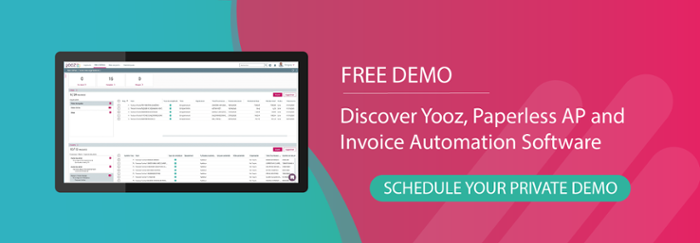Accounts payable is one of the core components of a small business's ability to operate. Understanding who you currently owe money to, how much, and for what is a key part of maintaining and growing the business and having an efficient accounts payable function will help ensure that you are making payments on time and maintaining healthy supplier relationships.
This means that as a small business owner, the majority of your time might be spent making sure your finances are up to date, that cash flow stays healthy, and that staff and suppliers are getting paid on time. All of these are clearly important, but at the same time you might feel that your time could be better spent elsewhere, such as on business development or customer support. Perhaps even acknowledging that you simply don’t have the right skills and knowledge of managing finances in this level of detail.
There are alternatives; constant developments in the area of automated invoice processing mean that you or your staff don’t have to spend time digging through the weeds to find out the financial situation of the business. Suppliers and vendors can be paid on time and for the correct amount on every single occasion, without the fear of human errors, financial losses, or fines hitting the business. Simply put, a small business owner could accelerate accounts payable by implementing Accounts Payable (AP) automation. What does this mean?
Accounts Payable for small businesses
Accounts payable essentially describes the outstanding bills your business has to pay. Everything apart from payroll will fall into this category, therefore making it an integral part of running the business. Payments that can come under accounts payable go further than paying suppliers, including costs for things like energy and gas bills, monthly payments for any software-as-a-service (SaaS) subscriptions, or even any other office supplies, equipment, uniforms, stationary, etc.
In simple terms, all of accounts payable can be divided into three related but distinctly separate steps: purchasing of products or services, receiving orders, and paying suppliers. Not only are these three related, they fall under mandatory legal time constraints. For example, in the UK businesses are required to pay invoices to other businesses within 30 days unless stated otherwise (or if you’ve come to a separate agreement). A business that doesn't pay within this timeframe through late or mispayments not only face fees and penalties but can find that it negatively affects their reputation with suppliers, vendors, and customers. In a time of rising inflation and a unpredictable supply chain, anything perceived as negative can eventually close down a small business.
The influence over the business cash flow means that both the accuracy and efficiency of a business’s financial statements rest on accounts payable. This is a lot of pressure when you've also got to focus on revenue generation, customer support, human resources, recruitment, and many other important factors. With so many factors resting on the shoulders of a small group of people, it can be difficult to get a firm grip on day-to-day finances and forecasting for the future.
Unfortunately, despite recognizing the importance and influence, a small business owner might not be in a position to have a dedicated finance department (let alone staff that focus solely on the AP process). All this simply means that automating accounts payable have become and even more vital solution.
Tell me about automation software
Automated AP software has become the preferred choice of many small businesses, offering a way to utilise resources and staff time much more efficiently than before. For example, UK accounts payable staff spend an average of 27 hours of their time every month just managing vendor invoices, while the average time to approve payment for invoices is around 18 hours.
One of the biggest reasons behind this is the reliance on manual processes, including data entry onto Microsoft Excel spreadsheets, and even sending and processing paper invoices. All. By. Hand. The workflow process is time-consuming and indeed, also increased the chance of fraud or errors entering into the fold. Staff are only human after all, and it can be easy to mistake a decimal point or the total cost of something when entering it into a spreadsheet. Not only can this increase the chances of mispayments, but it can also lead to strained relationships with suppliers as you try to figure out where the mistakes came from plus how to rectify them.
Contrary to all of these issues, an automated AP workflow goes far beyond identifying small errors made in the data entry process. For example, the software can quickly scan through all the invoice content that it receives, identify any issues, and ensure the accuracy of all the data. Thanks to three-way matching, invoices are checked against historical documents, purchase orders raised, and order receipts to ensure that payments are for the correct amount and to the right supplier with minimal need for human interaction. "Good" data continues, "bad" data is immediately stopped.
Since fraudsters have seen a lot of success in creating shell accounts and fake documents to get businesses to make payments, this ability to identify the outliers and ensure accuracy means a reduction in successful fraud attacks.
Consider also that automation software doesn't get tired, nor does it need to stop and rest. It can run 25/7, increasing productivity and making sure that payments are sent both accurately and on time, perhaps even early (thus obtaining any discounts offered as an incentive and reward).
Does automating accounts payable help with Making Tax Digital compliance?
One of the biggest challenges for small business owners recently has been the UK government’s and HMRC’s Making Tax Digital (MTD) programme. According to MTD, since April 2022 all VAT-registered businesses must comply with the new digital rules for tax returns Since it was brought about to address the problem of lost tax revenue (and reap potentially billions of pounds), a company which don't have the proper (required) procedures and systems in place risk serious financial penalties. This includes making sure there is a fully digitised record of historical invoices as well as implementing digital systems that comply with the new way of declaring tax. So, although the new rules won’t affect the deadlines for which to send tax returns, it does bring about new processes to get accustomed to.
An automated AP system helps ensure compliance, helping to streamline the MTD process, save time on declaring your tax returns, and by ensuring data accuracy helps almost completely remove the chances of tax submission errors (and therefore the chances of your business being penalised). And if should be any questions? The automated process creates a real-time audit trail for each invoice.
What about growth? Can I bank on the system for when I'm no longer considered small?
Although you might think that your business has a handle over its accounts payable function right now, the issues highlighted above will only multiply as you grow and expand. Soon you might be expected to handle, process, and approve hundreds of invoices every month, something which even the most skilled of accounts payable professionals will struggle to deal with.
Fortunately, software doesn't get tired or need a break, nor does it experience human frailties. It isn't deterred by a growing number of invoices. In fact, automated AP software doesn't even think about the amount of information it is processing. Rather, it is an agile process and partner that will grow alongside you. This efficiency is epitomized in Automated Invoice Processing, which effortlessly scales to manage increasing invoice volumes, ensuring accuracy and timeliness in every transaction









